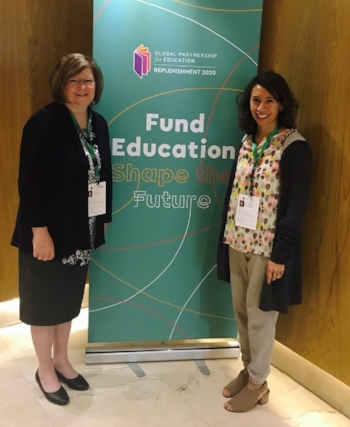Five Education Diplomacy takeaways from Global Partnership for Education’s Financing Conference


 GPE and Education Diplomacy
GPE and Education DiplomacyGPE works to encourage nations to commit financial resources to education. This partnership is an ideal example of Education Diplomacy in action. In order for financing commitments to be pledged to GPE by nations, individuals representing nations must move through a process within their own country of dialogue, debate, negotiation, mediation, consensus building and when needed, compromise. Decisions about the commitment of funds to support education both from donor nations and countries that are contributing to education through their national budgets are intense and often require diplomatic intervention in order to reach agreement. Inclusion of the voices of civil society organizations is also important in the partnership and diplomacy process since civil society plays an important role in ensuring government accountability to their financing commitments. Diplomatic skills are, therefore, critical in the find commitment process and the inclusion of multiple stakeholders to the partnership approach of global education financing.
The Global Partnership for Education (GPE) is a global funding mechanism and partnership process that solicits the financial support of nations in order to advance education. A GPE Financing Conference, hosted by the governments of Senegal and France, took place in Dakar on February 1-2.
ACEI is a member of a network of civil society organizations that support the work of GPE. Therefore, Diane Whitehead, ACEI’s Executive Director, and Yvette Murphy, Director of our Center for Education Diplomacy and Global Advocacy, were pleased to participate in the financing conference. ACEI was among a handful of U.S.-based international organizations on-site in Dakar advocating through a global coalition, the Global Campaign for Education.
During the conference, donor countries, including France, Denmark, and Norway, pledged $US 2.3 billion to finance education globally through the year 2020, while the greatest source of financing came from developing nations themselves. Partner developing nations including Ghana, Pakistan, and Guyana pledged 20% or more of their national budgets to education in their respective countries through 2020. These funds are critical to improving education access and quality for millions of children around the world. See a complete list of contributing nations here.
1. Context and Balance
The 2018 GPE Financing Conference was significant because it was the first time that the event was co-hosted by both France and Senegal and held in Dakar, Senegal, a developing partner country. Diplomatically, context matters, and the location of the financing conference signaled that investment in education requires balanced partnership, which is at the heart of GPE.
2. Consensus and Participation
Three months ahead of the GPE Financing Conference, civil society organizations came to consensus on a Compact on Domestic Financing, which called on partner developing countries to increase their domestic investment in education. During a CSO event the day before the conference, approximately 250 civil society organizations from 40 countries agreed upon and adopted a joint statement on education financing. Both efforts signal the participatory role and active engagement of civil society organizations in ensuring every government upholds the right to education for every child and is accountable to their commitment to invest in equitable, quality education.
3. Partnership and Dialogue
If partnership is at the heart of GPE, the platform for ongoing dialogue among all stakeholders, including teachers, policymakers, government leaders, civil society organizations, philanthropy, and private business, has become increasingly important. Partnership Day at the GPE Financing Conference provided insight on the important conversations necessary for solving global education challenges and ensuring sustained financing is available to develop solutions for the hundreds of millions of children and youth who are not receiving equitable, quality education.
4. Sustainability and Accountability
After the GPE conference, Julia Guillard, Board Chairperson of GPE and former prime minister of Australia, was optimistic about a clear trend to seriously address the global learning crisis. Despite falling short of the financing conference’s $3.1 billion target, donor country commitment of $2.3 billion was a significant increase to the $1.3 billion raised during the last funding period, giving credence to Guillard’s optimism. However, to achieve sustainable financing that ensures every child has access to equitable, quality education, developing country governments will need to “make a breakthrough in their own efforts to increase education financing,” as recommended in the Compact of Domestic Financing.
5. Collaboration and Justice
The 2018 GPE Financing Conference placed a spotlight on the strengths of partner developing countries by holding the event in Senegal and by providing a stage for developing countries to share their progress and potential to meet their respective specific education needs. As mentioned earlier, governments will need to expand their overall budgets, through increasing the domestic tax base in order to further progress and realize their potential.
According to ActionAid, a participating organization at the conference, educators and tax reformers will need to collaborate to transform financing of education as a public good and help government leaders to understand the links between education justice and tax justice.
Resources
Unprecedented worldwide support of the Global Partnership for Education and Addressing the Global Learning Crisis (Global Partnership for Education)
GPE Replenishment misses targets, But sees ‘turning point’ in education financing (Devex)